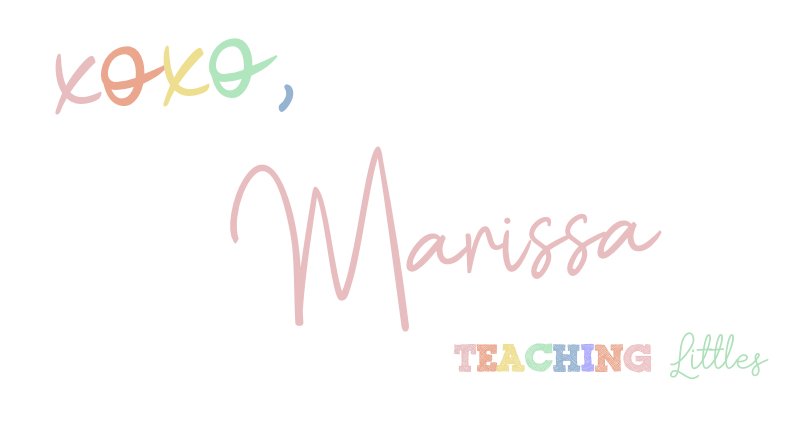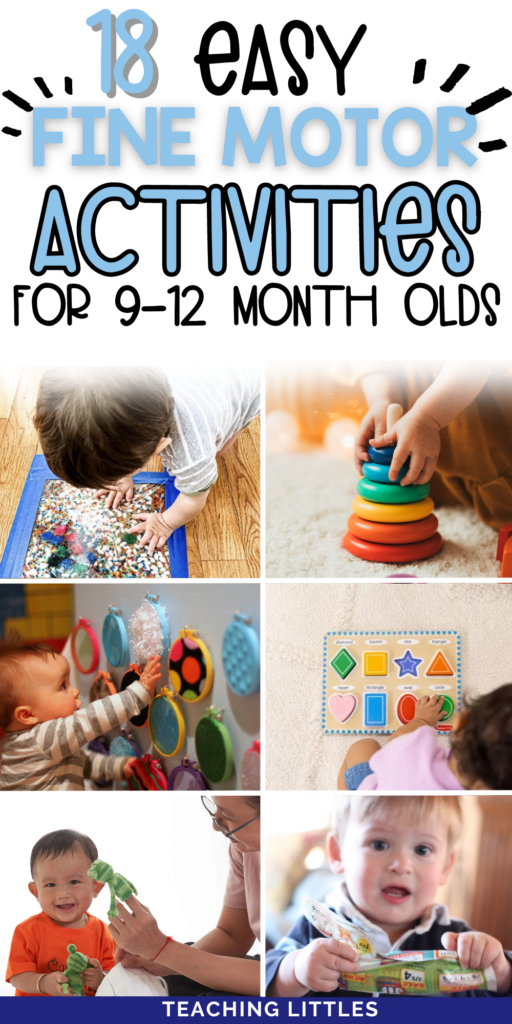As a parent, it’s our job to support and encourage our baby’s growth. We want our children to learn as much as they can while also having fun.
Children at this age learn best through play. From tapping buttons on a toy to exploring a basket of knick-knacks, they are constantly learning by touching, feeling, seeing, and entertaining themselves.
It’s important to make activities educational, just as much as they are fun.
Fine Motor Skills in Infancy
Fine motor skills are important for a baby to develop. They involve the small muscles in the hands and fingers, allowing them to grasp and manipulate objects. They allow us to produce movement, coordination, and strength
For adults, we use these skills and muscles to write, type, feed ourselves, turn a door knob, sew a button, give a massage, cook dinner, and so much more. It’s important to have these muscles fine tuned in order to live our life successfully.
But what do fine motor skills look like in a baby 9-12 months old? They give them the ability to:
- Self-feed finger food
- Explore objects (wave, shake, squeeze, turn)
- Hold two toys at the same time and transfer them hand-to-hand
- Hold own bottle
- Hold own utensils
- Wave hello or goodbye
- Drop and pick up toys
- Put things in/out containers
- Turn pages in a book
- Clap hands
Check out the Fine Motor Skills Checklist for a comprehensive review and free printable checklist to keep up with your baby’s fine motor milestones.

Activities to Promote Fine Motor Skills in Your 9-12 Month Old Baby
It’s simple to find lots of activities to support your babies fine motor skills! Everyday activities that your baby loves will offer practice with these skills.
It’s all about getting those little hands and fingers moving which they’re doing on a daily basis. Your baby will learn just as much with everyday, household objects, as they will with expensive toy.
Below are some activities that require little set-up, but lots of learning opportunities. Some are activities that your child probably does daily that you may not realize are working on these skills.
Related Post: 7 Simple Tips to Teach My Baby a New Motor Skill
1. Turning Pages and Flaps in Books
While reading your child their bedtime story, have them turn the pages and pick up the flaps in their book. Even while they are just exploring and playing with books, they are practicing this skill.
Board books with thick pages and flaps are still the best at this age. My daughter absolutely loves Lift-the-Flap books where she can open a flap to see a surprise picture behind.
2. PomPom Whisk

This pompom whisk activity is simple and only requires 2 items. It requires your baby to use a pincer grasp (thumb and pointer finger together) to pull out the pompoms.
Just stuff a bunch of pompoms in a kitchen whisk and watch them be entertained while pulling them out with their little fingers.
Read the full post about this activity here: Pom Pom Whisk Activity for Babies
3. Waving Hi and Bye
Your little one will see people and faces everyday, teach them how to wave hi and bye whenever they greet someone.
They may open and shut their hand/fingers or simply wave their hand and arm side-to-side. Either way, they are learning a new fine motor skill this way.
4. Edible Finger Paint
This is a great activity to get your babies hands and fingers moving, touching, and feeling with wet, colorful paint.
5. Using Utensils

I know this seems like the messiest activity of them all and you may cringe at having to wipe yogurt off the ceiling. However, teaching your baby to use utensils is a great fine motor skill to practice.
I LOVE Grabease utensils for this age because they are super easy for little hands to grasp and makes self-feeding much easier than those long skinny spoons.
Your baby is a bit too young to be able to get the food successfully on their utensil, so you can help them out with that. Simply place the pre-loaded fork or spoon on the tray and let them pick it up and bring it to their mouth on their own.
6. Dropping and Releasing Items into Containers
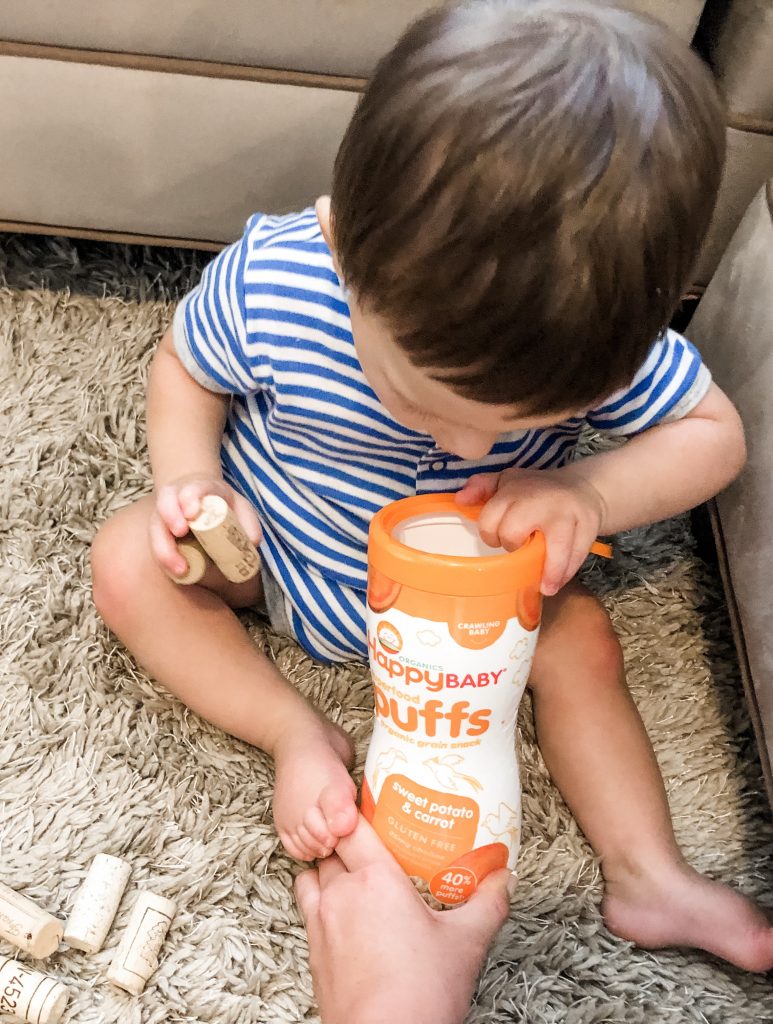
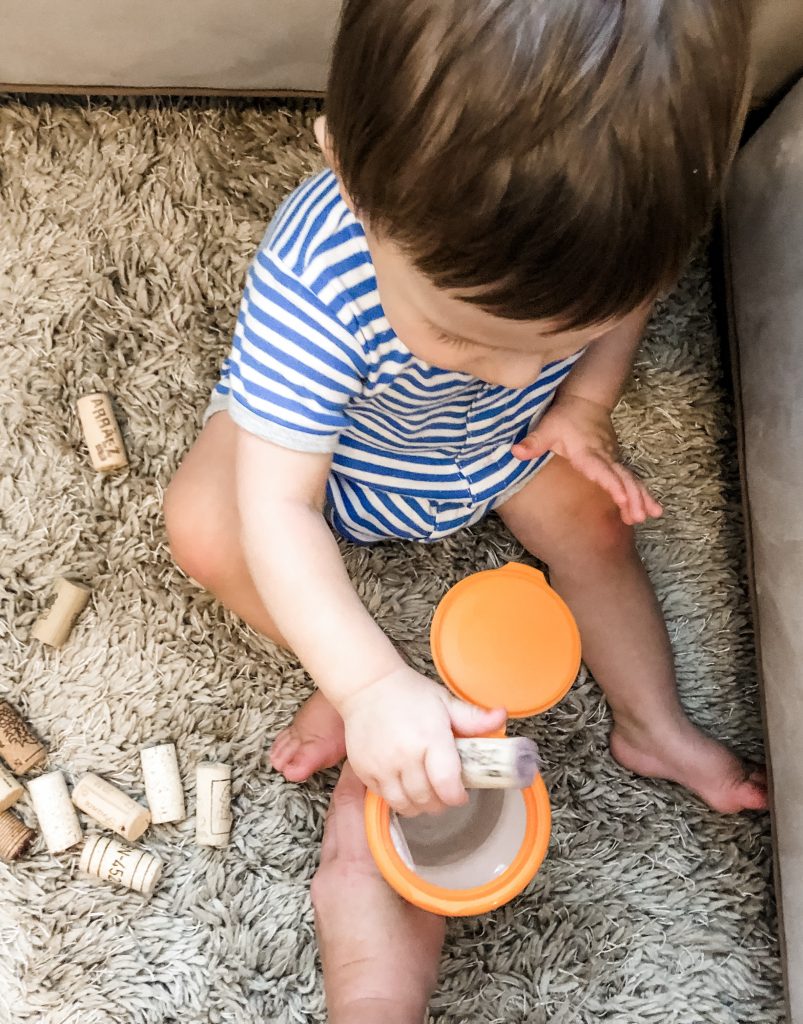
Dropping or releasing items into a container is a skill that emerges around this time. Have your baby grab small objects and drop them in (after you demonstrate it for them first).
I love using simple, reusable household items to make activities for my babies and toddlers. This one uses a Puffs container and wine corks! He loved it.
You can also use shape sorters (without the top on) or any baskets, cups, Tupperware, etc. Have them drop in wooden blocks or small shapes and animal toys that you have on hand.
Check out many more Simple and Inexpensive Activities You Can Do With Household Items here.

Also, releasing coins into this piggy bank is a great way for your baby to learn this skill. They will probably need help lining up the object with the slot, but pushing it in should be a fun activity for your baby.
7. Self-feeding

Mealtime is the ultimate sensory and fine motor learning experience. Since babies are typically motivated by food, they’ll love trying to pick up their favorites and bring them to their mouth.
Self-feeding just requires their hands and small pieces of food (that they can safely chew). Let them explore and play as they use a pincer grasp to hold the pieces between their fingers.
8. Stacking cups
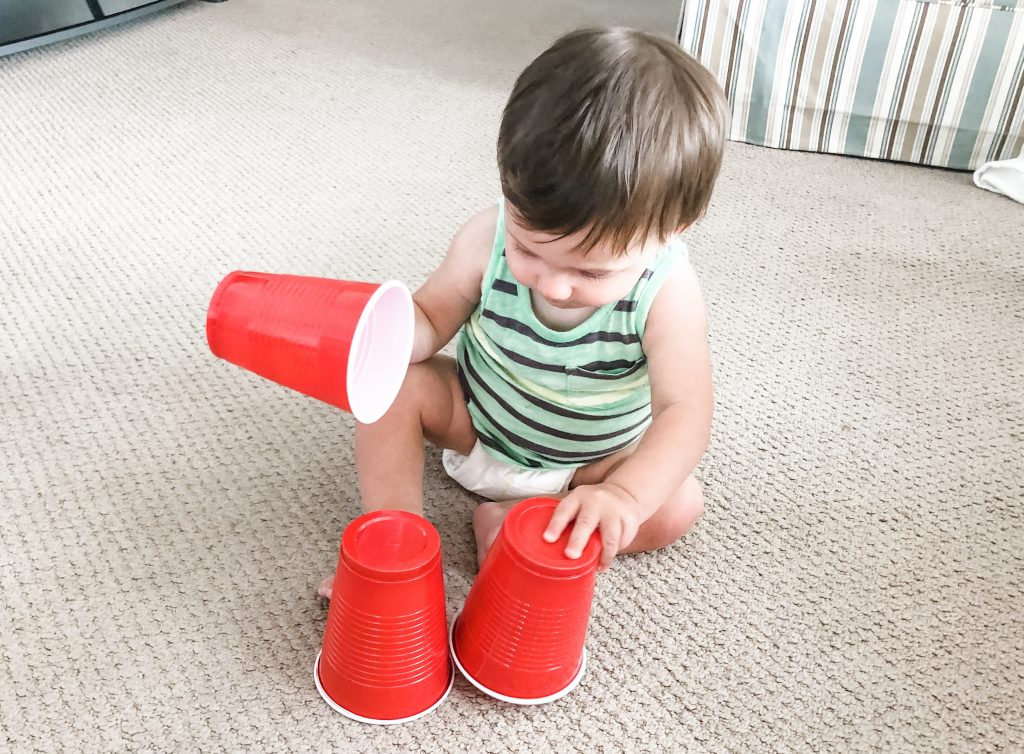
Ok, they may not be able to stack the cups perfectly quite yet, however your little one will love playing with cups. They can attempt to stack them, put objects inside them, or even roll them around the floor and chase after them.
Solo or plastic cups work find for now, but these stacking cups are perfect if you want to make the extra purchase.
9. Frozen Toys
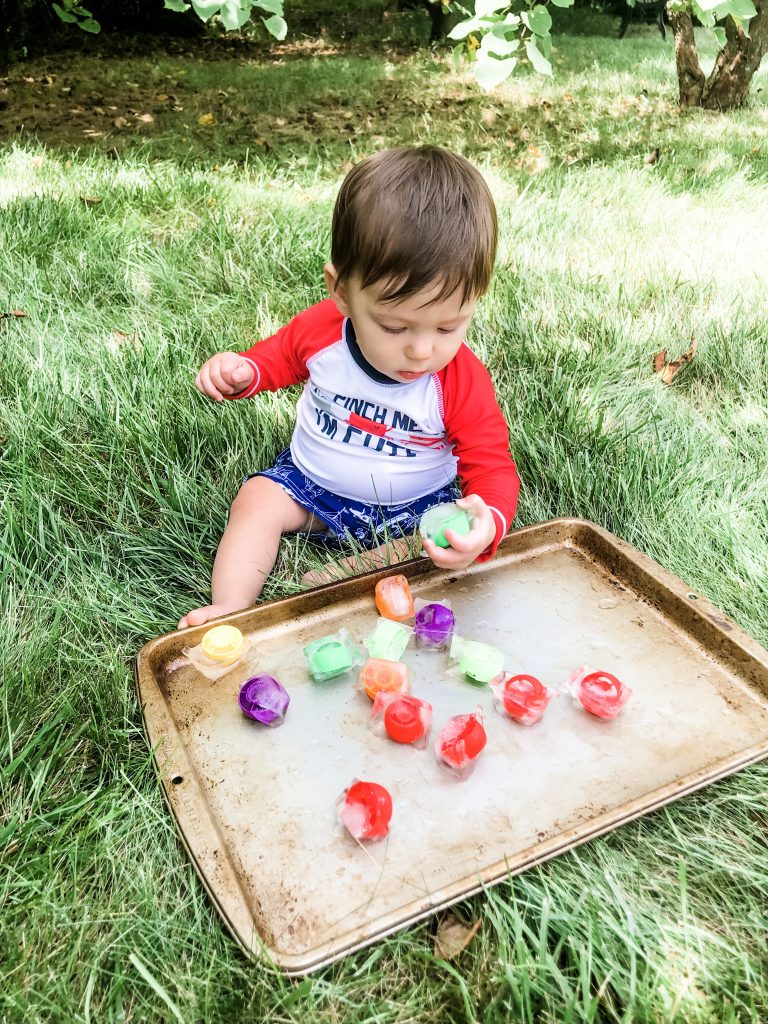
It’s simple to freeze small objects (pompoms, pouch caps, large beads) in a ice cube tray and let your baby have a blast feeling the cold and wetness of the ice cubes. They’ll also get to explore the objects as the ice melts.
This is a simple activity, but read the full explanation here: Frozen Toy Outdoor Sensory Activity
10. Opening and Closing Doors and Drawers
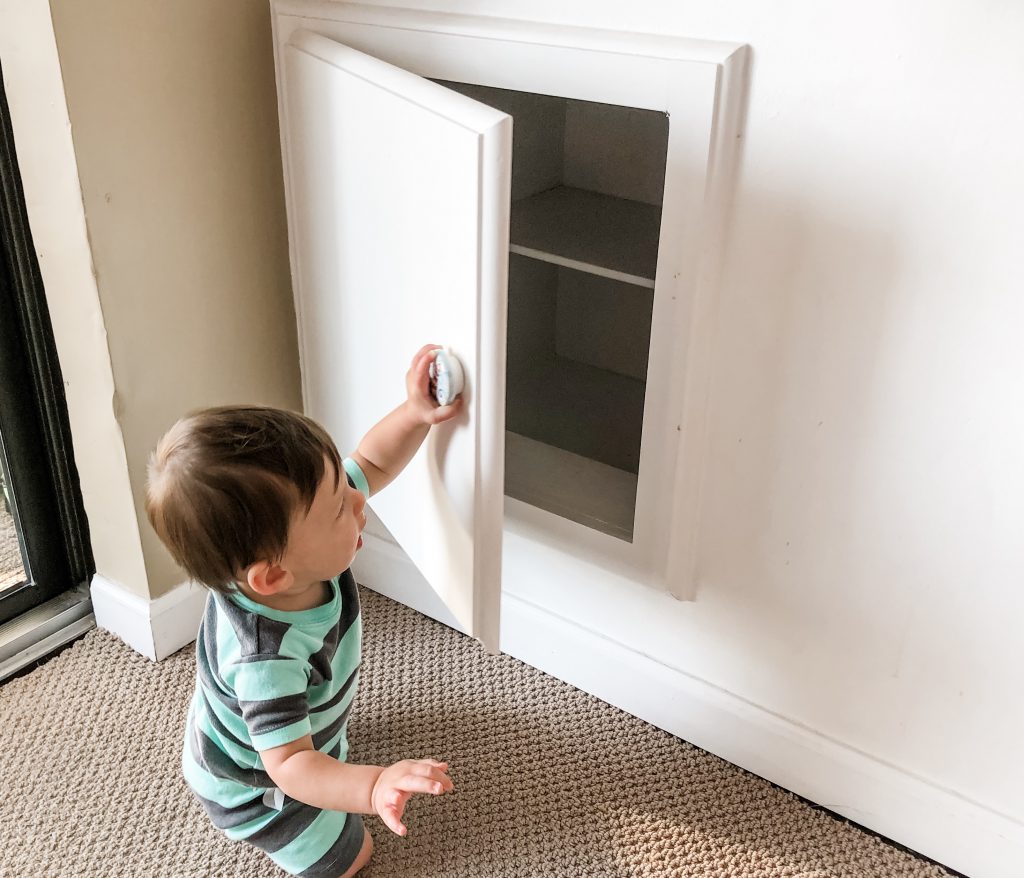
Your baby will be so fascinated with learning and exploring their whole environment now that they are crawling (or maybe even walking). Sit them next to an empty drawer or door that they can open and close and watch their amazement.
Related Post: Fine Motor Skills Checklist
11. Squeezing Sponges
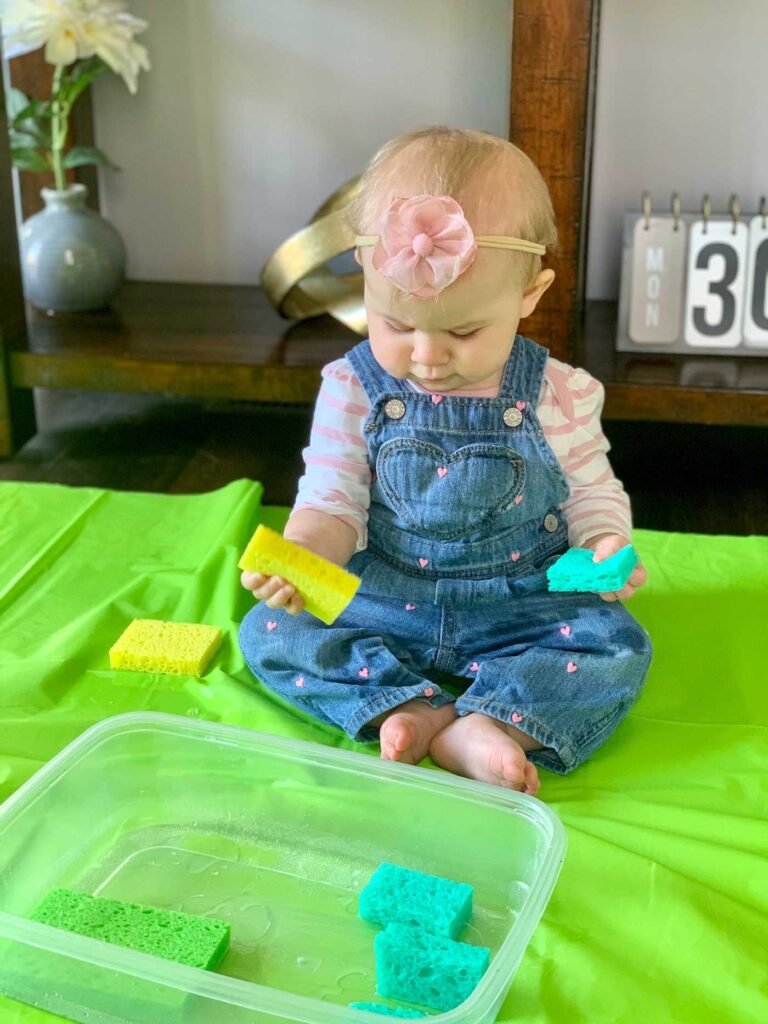
Fill a shallow container with water and give your child some sponges or washcloths to play with. Show them how to squeeze the water out and watch as they experiment with different grips and pressures.
12. Chunky Puzzles

Look for puzzles designed for toddlers with large, easy-to-grasp pieces. Encourage your child to pick up the pieces and place them in the correct spots. Start with simple, colorful puzzles and gradually increase the complexity as they improve.
13. Tearing Paper
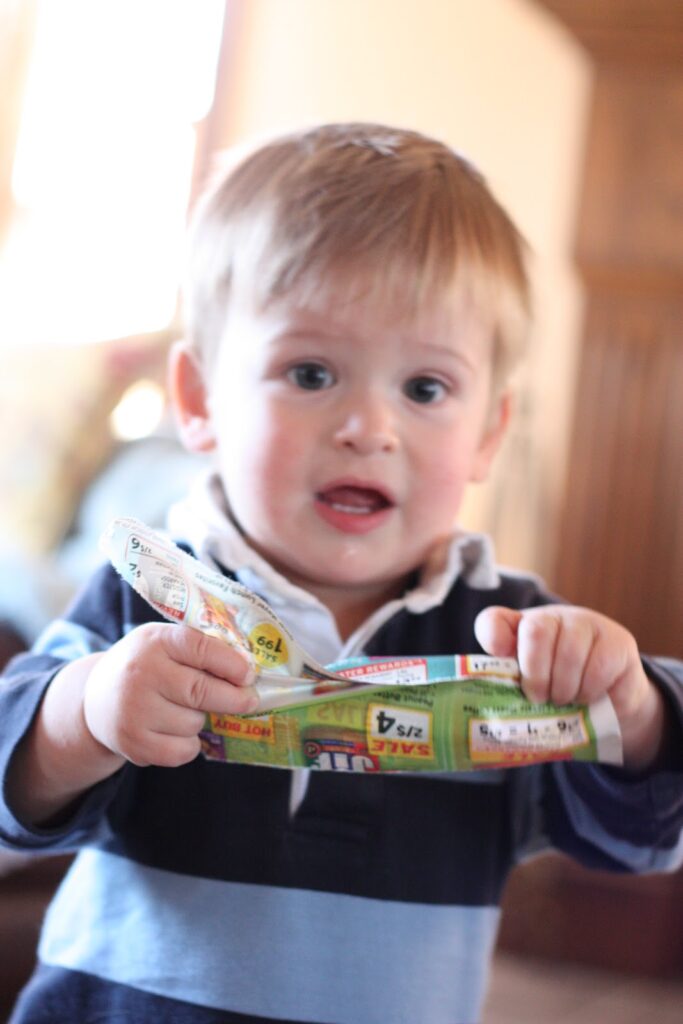
Provide your child with some old magazines or newspapers and show them how to tear the paper into smaller pieces. This activity not only helps with fine motor skills but also introduces them to different textures and sensory experiences.
14. Stacking Rings
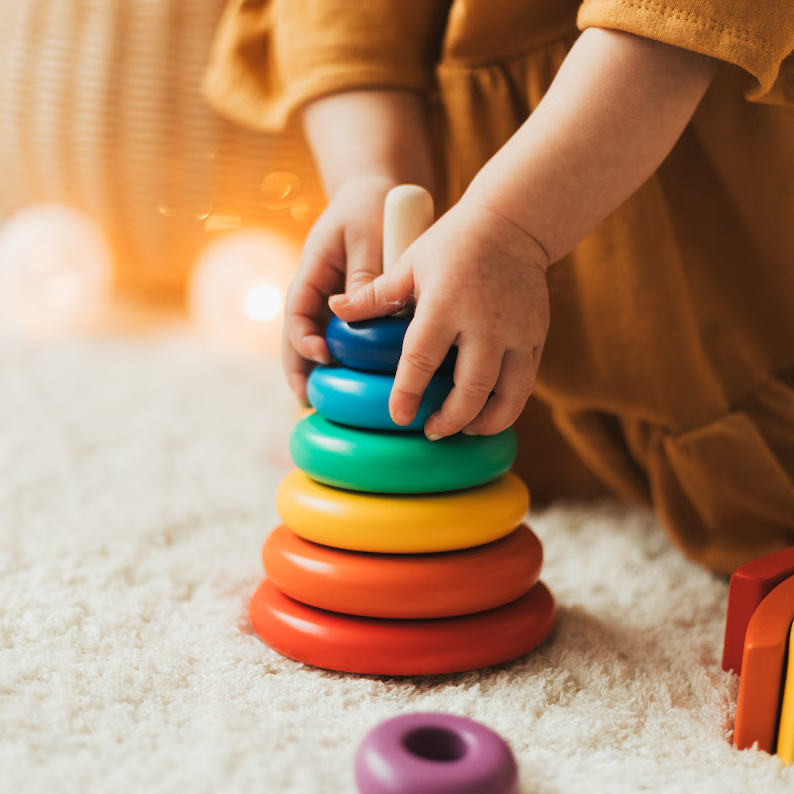
Introduce your child to stacking toys like rings or cups designed for their age group.
Demonstrate how to stack them from largest to smallest, and let them explore different ways to stack and knock them down.
This activity helps with hand-eye coordination and finger dexterity.
15. Exploring Texture Boards
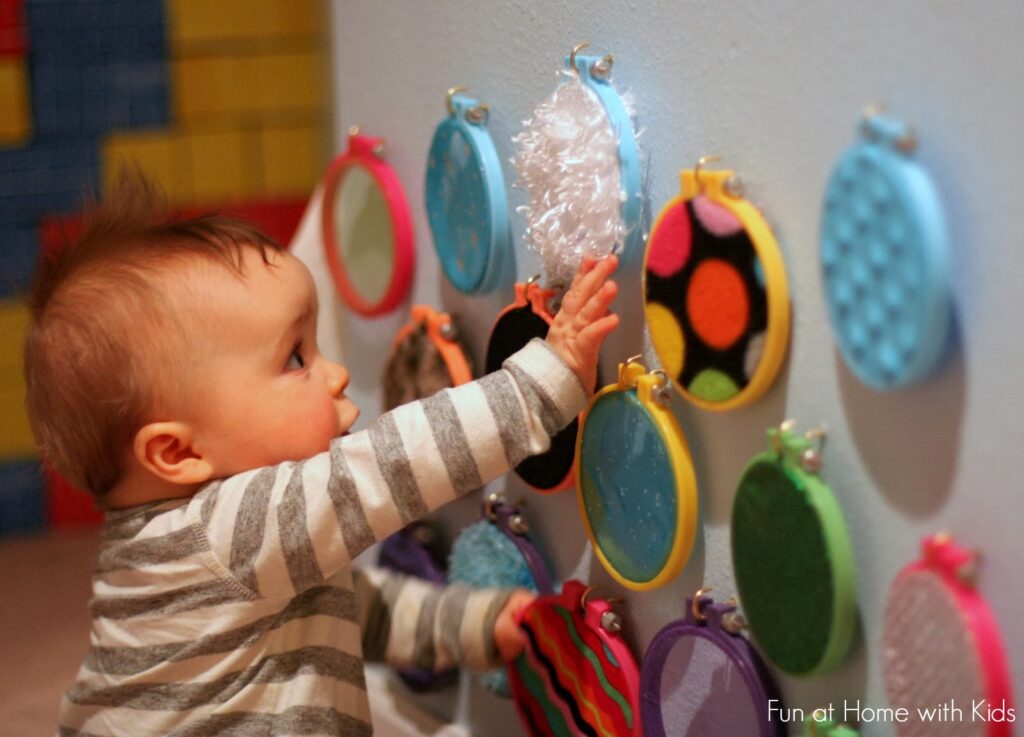
Create a simple texture board using various materials such as sandpaper, fabric scraps, bubble wrap, or cotton balls glued onto cardboard squares.
Let your child touch and explore the different textures, encouraging them to use their fingers to feel and manipulate the materials.
16. Sensory Bins with Scooping and Pouring

Fill a shallow bin with sensory materials such as rice, dried beans, or water beads.
Provide small cups, spoons, or scoops for your child to practice scooping, pouring, and transferring the materials from one container to another.
This activity enhances hand-eye coordination and develops the pincer grasp.
17. Push-and-Pull Toys
Give your child push-and-pull toys that require them to use their hands and fingers to grip and manipulate the toy.
Examples include wooden cars, pull-along animals, or toys with strings to pull. These toys help strengthen hand muscles and improve coordination.
18. Finger Puppet Play

Introduce finger puppets or simple hand puppets to engage your child in imaginative play.
Help them put the puppets on their fingers and encourage them to move the puppets around, creating different actions and sounds.
This activity stimulates finger movement and coordination while sparking creativity.
These activities are designed to be engaging and developmentally appropriate for 9-12 month olds, promoting the growth of their fine motor skills in a fun and playful way.
